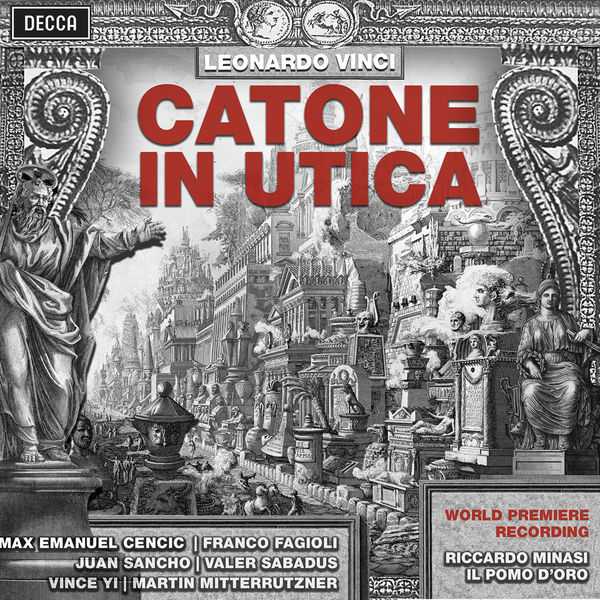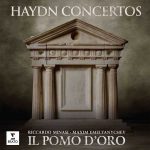

Composer: Leonardo Vinci
Performer: Juan Sancho, Max Emanuel Cenčić, Vince Yi, Valer Barna-Sabadus, Martin Mitterrutzner, Franco Fagioli, Valer Sabadus
Orchestra: Il Pomo d’Oro
Conductor: Riccardo Minasi
Format: FLAC (tracks)
Label: Decca
Catalogue: 4788194
Release: 2015
Size: 4.25 GB
Recovery: +3%
Scan: yes
Catone in Utica
01. Sinfonia I
02. Sinfonia II
03. Sinfonia III
Act 1
04. “Perché sì mesto o padre? ”
05. “Con sì bel nome in fronte”
06. “Poveri affetti miei ”
07. “Non ti minaccio sdegno ”
08. “Che giurai! Che promisi!”
09. “Che legge spietata!”
10. “Dunque Cesare venga”
11. “Io conquest’occhi ”
12. “Si sgomenti alle sue pene”
13. “Tu taci Emilia?”
14. “Nell’ardire che il seno t’accende”
15. “Quanto da te diverso”
16. “Piangendo ancora rincecer suole”
17. “Se gli altrui folli amori”
18. “O nel sen di qualche stella”
19. “Giunse dunque a tentarti”
20. “Pur ti reveggo, o Marzia”
21. “Chi un dolceamor condanna”
22. “Mie perdute speranze”
23. “E’ in ogni core diverso amore”
24. “Se manca Arbace”
25. “Un certo non so che”
26. “Ah troppo dissi”
27. “E’ folia se mascondete”
Act 2
28. “Romani, il vostro duce”
29. “Va’, ritorna al tuo tiranno”
30. “A tanto eccesso arriva l’orgoglio di Catone?”
31. “So, che pieta non hai”
32. “E qual sorte è la mia!”
33. “Soffre talor del vento”
34. “Lode agli dei La fuggitiva speme”
35. “In che t’offende”
36. “Tu vedi o bella”
37. “Per te spero”
38. “Oh dei tutta se stessa”
39. “Nascesti alle pene”
40. “Si vuole ad onta mi ache Cesare s’ascolti?”
41. “Se in campo armato”
42. “Ah signor che facesti?”
43. “Dovea svenarti allora”
44. “Sarete paghi alfin”
45. “So che godendo vai”
46. “Udisti Arbace? Il credo appena”
47. “Se sciogliere non vuoi”
48. “L’ingiustizia, il disprezzo”
49. “Che sia la gelosia”
Act 3
50. “Tutto amico ho tentato”
51. “La fronda che circonda”
52. “Quanti aspetti la sorte cangia in un giorno!”
53. “Confusa, smarrita”
54. “Qual’insoliti moti”
55. “Combattuta da tante vicende”
56. “Del rivale all’aita”
57. “Quell’amor che poco accende”
58. “Pur veggo alfine un raggio d’incerta luce”
59. “È questo amici il luogo”
60. “Deh, in vita ti serba”
61. “Dove mai l’idol mio”
World premiere recording of an opera by a Neapolitan master fast gaining a first-rate modern reputation. Max Emanuel Cencic gathers around him an intoxicating mix of stratospheric countertenors, a top tenor, and an orchestra who sizzle with excitement for a performance of an opera that will appeal to all fans of Baroque music’s unsung heroes.
As March’s ‘Five Countertenors’ album showcased, the age of the countertenor is here. Max Emanuel Cencic has gathered around him, once again, a superb cast to bring Vinci’s “Catone In Utica” to vivid life.
“Vinci is the Lully of Italy: true, simple, natural, expressive”- for generations Leonardo Vinci was just another obscure Baroque composer: this first-rate recording will lift the veil from this forgotten genius of Italian opera, and from the mysterious all-male world of the 18th-century Roman stage.
With a libretto by Metastasio, Vinci’s opera was unveiled in Rome in 1728 with an all-male cast (women having been banned from the stage by the Pope): countertenors took the three heroic male roles as well as the female parts.
As well as Cencic (Arbace), the other superb countertenors are Franco Fagioli (Cesare), Valer Sabadus (Marzia), and Vince Yi (Emilia). Tenor Juan Sancho takes the title role (Catone) in this stage work about Julius Caesar’s defeat of the Republican forces led by Marcus Portius Cato in 46BC, and Riccardo Minasi, who enjoys a considerable reputation for his recordings of Baroque repertoire, conducts.
Opera seria of the 18th century, known mostly to specialists 30 years ago, was rediscovered by virtuoso sopranos and countertenors. Now it’s ready for prime-time in the form of full-opera recordings, on a major label, with top-notch singers. Countertenor Max Emanuel Cencic appeared in a Virgin Classics recording of Leonardo Vinci’s opera Artaserse and followed it in 2015 with this version of the same composer’s Catone in Utica, a tale of the military and romantic intrigues surrounding the conflict of Cato the Younger (or Cato of Utica) with Julius Caesar, ending with the suicide of the former. The libretto, by Pietro Metastasio, became one of the most popular of the entire century, with settings by Vivaldi, J.C. Bach, and, as late as 1789, Giovanni Paisiello. Even Handel reworked a setting by Leonardo Leo and others for the Haymarket in London, but this was the very first version, premiered in Rome in 1728. Because of the Pope’s ban on female performers, it was written for an unlikely quartet of countertenors in lead roles. This actually works, though: musically, the opera alternates between big martial set pieces and lush romantic numbers whose melodic ease looks forward to Gluck (sample the Act II, scene 6 aria of Marzia, Cato’s daughter, CD 2, track 12). Cencic and Franco Fagioli, as Caesar, have the power to rise above the natural horns of the historical-instrument ensemble Il Pomo d’Oro, and all the singers deliver dramatically convincing performances that give the lie to the usual conception of opera seria (when people have any conception of it at all) as a dramatically static vehicle for virtuoso singing. This is a splendid recording, with sound from the appropriate Villa San Fermo in Lonigo that blunts none of the considerable dramatic impact. At a time when democracies are often under siege, here’s an opera that matters, and that works, musically and dramatically.



